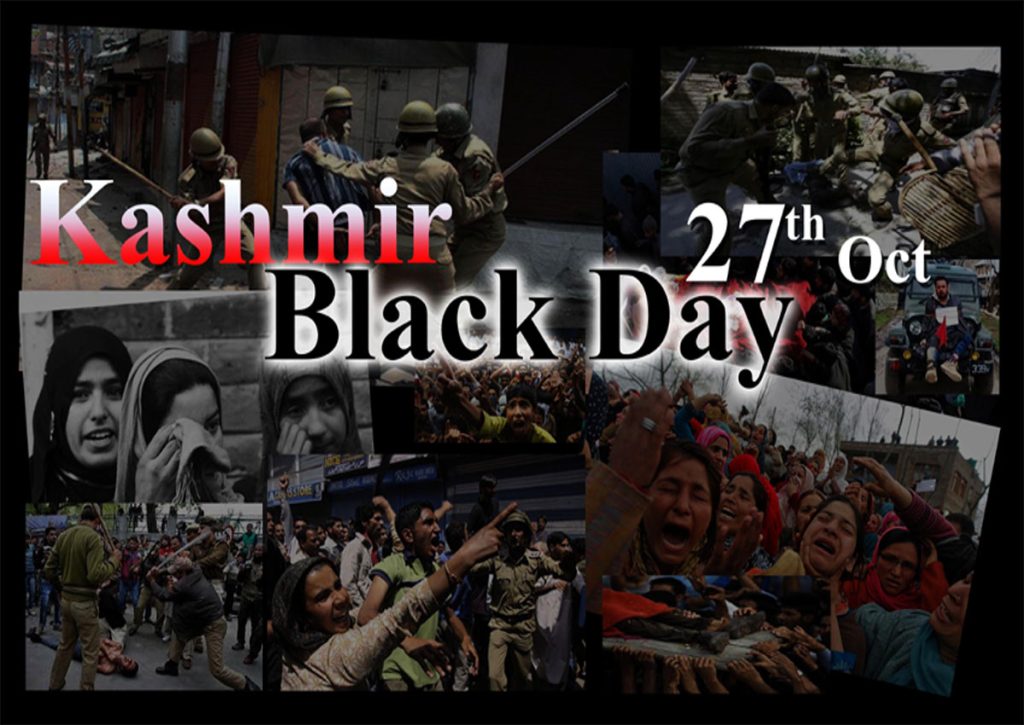Kashmir Black Day: A Symbol of Unfulfilled Promises and the Struggle for Justice
 By Isbah Aleem
By Isbah Aleem
 October 27, 1947, marks a poignant chapter in the history of Jammu and Kashmir, a day that resonates with sorrow and resistance for its people. Known as “Black Day,” it commemorates the arrival of Indian military forces in the region, an event that many Kashmiris perceive as the beginning of their struggle for self-determination. This day serves not only as a historical marker but also as a reminder of broken promises, lost lives, and the ongoing Kashmir dispute that has persisted for more than seven decades.
October 27, 1947, marks a poignant chapter in the history of Jammu and Kashmir, a day that resonates with sorrow and resistance for its people. Known as “Black Day,” it commemorates the arrival of Indian military forces in the region, an event that many Kashmiris perceive as the beginning of their struggle for self-determination. This day serves not only as a historical marker but also as a reminder of broken promises, lost lives, and the ongoing Kashmir dispute that has persisted for more than seven decades.
The roots of the Kashmir conflict can be traced back to the partition of British India in July 1947, which led to the creation of two independent nations: India and Pakistan. The princely state of Jammu and Kashmir, with its Muslim-majority population, found itself at a critical juncture. In response to the geopolitical shifts, the All Jammu and Kashmir Muslim Conference passed a resolution urging Maharaja Hari Singh to accede to Pakistan. However, the Maharaja hesitated, ultimately inviting military intervention that would alter the course of history.
On October 27, 1947, Indian troops entered Jammu and Kashmir, marking the beginning of a military occupation that would ignite a conflict still raging today. The situation escalated into a war, prompting India to bring the matter before the United Nations. Pakistan contended that the Maharaja’s accession to India was illegitimate. In response, the UN Security Council passed Resolution 47 (1948) and later Resolution 80 (1950), both of which called for a plebiscite to allow the Kashmiri people to determine their own future—whether to join India or Pakistan. Despite these resolutions, the plebiscite has never been conducted, effectively denying Kashmiris their right to self-determination. Instead, the region has endured decades of violence, repression, and geopolitical maneuvering.
The observance of Black Day on October 27 serves as a solemn reminder of the numerous atrocities that have occurred in Kashmir since 1947, including significant massacres that have left indelible scars on the region’s collective memory. One such tragic event is the 1947 Jammu Massacre, during which over 2.50 million Kashmiri Muslims were martyred by Dogra forces and Hindu extremists , and many more were forced to flee amidst communal violence. This horrific incident, characterized by large-scale displacement and loss of life, is viewed as a dark chapter in Kashmir’s history, fueling longstanding resentment and distrust toward Indian rule. The Jammu Massacre set a precedent for the continued cycle of violence in the region, with subsequent massacres further entrenching hostility and the call for self-determination.
Another harrowing episode is the Kunan-Poshpora incident of 1991, during which Indian occupation forces allegedly committed mass rape and sexual assault during a search operation in the twin villages of Kunan and Poshpora in Kupwara district. Often described as one of the worst human rights violations in the region, this incident has left a lasting impact on the survivors and their families. Despite repeated calls for justice, no one has been held accountable for the atrocities committed during that operation. The Kunan-Poshpora mass rape remains a potent symbol of the suffering endured by Kashmiris under military presence, with Black Day observed not only as a rejection of the past 76 years of occupation but also as a day to mourn and resist the ongoing injustices perpetrated against the people of Jammu and Kashmir.
The significance of Black Day extends beyond historical grievances; it encapsulates the broader struggle for dignity, justice, and the right to self-determination. Today, Jammu and Kashmir remains one of the most heavily militarized regions in South Asia, with its inhabitants continuing to suffer from human rights violations. Reports from organizations such as Human Rights Watch and Amnesty International document numerous cases of extrajudicial killings, arbitrary detentions, and increased surveillance. Yet, the international community has largely turned a blind eye to these violations, failing to hold those responsible accountable.
October 27 serves as a call to action rather than merely a day of mourning. The international community must not continue to ignore the ongoing violations occurring in the Indian-occupied territory of Jammu and Kashmir. It is imperative for global actors to stand in solidarity with the Kashmiri people and advocate for their right to live peacefully and freely in their homeland. The implementation of United Nations Security Council resolutions, particularly the call for a plebiscite, is essential for resolving the Kashmir conflict and ensuring that the voices of the Kashmiri people are heard.
For Kashmiris, October 27 is a stark reminder of their long struggle for freedom, justice, and dignity. The military intervention of 1947 set the stage for generations of Kashmiris to live in fear, and it is crucial for the global community to acknowledge the suffering experienced by the people of the region. As the world observes this day, it is imperative to fight for their autonomy over their destiny, ensuring that the call for justice and self-determination is not forgotten.
In conclusion, Black Day serves as a reminder for everyone to fulfill their duty to stand against human rights violations and injustice, striving to ensure peace in the region. The international community represents the last hope for Kashmiris to achieve peace and justice. It is time for the world to listen, act, and support the Kashmiri people’s quest for their rightful place in the global narrative of human rights and self-determination.
The writer is student of International Relations at Air University Islamabad and currently intern at Kashmir Institute of International Relations(KIIR)








